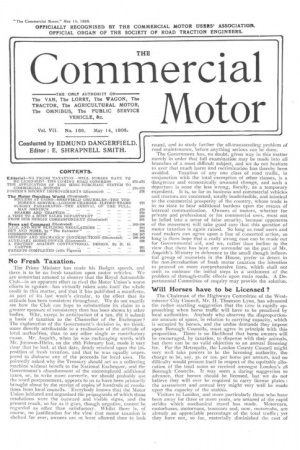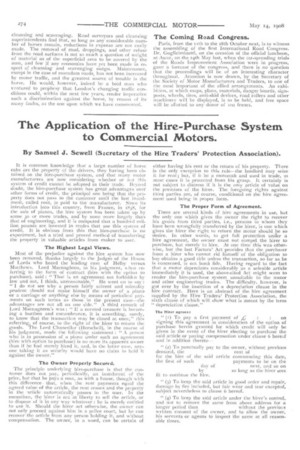No Fresh Taxation.
Page 1

Page 2

If you've noticed an error in this article please click here to report it so we can fix it.
The Prime -Minister has made his Budget speech, and there is to be no fresh taxation upon. motor vehicles. 1Ve are somewhat amused to observe that the Royal Automobile Club—in an apparent effort to rival the Motor Union's worst efforts in egoism—has virtually taken unto itself the whole credit in this matter, and that it has published a manifesto, as part of its last_ week's circular, to the effect that its attitude has been consistent.throughout. We do not exactly see how the Club can hope to substantiate its claim to a greater measure of consistency than has.been shown by other bodies. Why, except in anticipation of a tax, did it submit a basis of taxation to the Chancellor of the Exchequer? The .explanation of the Government's decision is, we think, more directly attributable to a realisation of the attitude of local authorities, than to any other single or contributory cause. Mr. Asquith, when he was exchanging words with Mr. joynson-Hicks, on the t8th February last, made it very clear that he had, at that date, firmly resolved upon the imposition of fresh taxation, and that he was equally unprepared to disburse any of the proceeds for local uses. He pointedly asked why the Treasury should act as a collecting machine without benefit to the National Exchequer, and the Government's abandonment of the contemplated additional taxes, or, to write more correctly, we should probably use the word postponement, appears to us to have been primarily brought about by the receipt of copies of hundreds of resolutions from local councils. Everybody knows that the Motor Union initiated and organised the propaganda of which those resolutions were the outward and visible signs, and the present result, so far as it goes, though negative, cannot be regarded as other than satisfactory. Whilst there is, of course, no justification for the view that motor taxation is shelved for ever, owners are at least allowed time to look
round, and to study further the all-transcending problem of road maintenance, before anything serious can be done.
The Government has, no doubt, given way in this matter merely in order that full examination may be made into all branches of a most difficult subject, and we do not hesitate to aver that much harm tind recrimination has thereby been avoided. Taxation of any one class of road traffic, in conjunction with the total exemption of other classes, is a dangerous and economically unsound change, and such a departure is none the less wrong, fiscally, as a temporary expedient. It is, so far as business and commercial vehicles and tractors are concerned, totally inadmissible, and inimical to the commercial prosperity of the country, whose trade is in no state to bear additional burdens upon the means of internal communication. Owners of motors, whether for private and professional or for commercial uses, must not be lulled into a sense of false security, because opponents of the movement will take good care that this question of motor taxation is again raised. So long as road users and road makers can agree upon a line of concerted action, so long is there hope that a really strong case can be made out for Governmental aid, and we, rather than incline to the view that there has been any surrender on the part of Mr. Asquith's Ministry in deference to the small though influential group of motorists in the House, prefer to detect in the non-introduction of fresh motor taxation the intention to proceed on more comprehensive lines, which shall not omit to embrace the initial steps in a settlement of the problem of through-traffic effects upon main roads. A Departmental Committee of enquiry may provide the solution.
Will Horses have to be Licensed ?
The. Chairman of the Highways Committee of the Westminster City Council, Mr. H. Thomson -Lyon, has advanced the rather startling suggestion that the time is rapidly approaching when horse traffic will have to be penalised by local authorities. Anybody who observes the disproportionate amount of space, in relation to carrying capacity, which is occupied by horses, and the undue demands they impose upon Borough Councils, must agree in principle with this proposition. There is no likelihood that horse owners will be encouraged, by taxation, to dispense with their animals, but there can be no valid objection to an annual licensing fee. For the Metropolis, the London County Council might very well take powers to be the licensing authority, the charge to be, say, 56. or los. per horse per annum, and no difficulty would present itself in respect of the equitable allocation of the total sums so received amongst London's 28 Borough Councils. It may seem a daring suggestion to advance, that horses should be licensed, but we do not believe they will ever be required to carry license plates : the assessment and annual levy might very well be made upon the capacity of the stables.
Visitors to London, and more particularly those who have been away for three or more years, are amazed at the rapid strides which mechanical travel has made. Motorcars, motorbuses, -motorvans, tramcars and, now, motorcabs, are already an appreciable percentage of the total traffic ; yet they have not, so far, materially diminished the cost of cleansing and scavenging. Road surveyors and cleansing superintendents find that, so long as any considerable number of horses remain, reductions in expense are not easily made. The removal of mud, droppings, and other refuse from the road surfaces is not so much a question of weight of material as of the superficial area to be covered by the Men, and few if any economies have yet been made in respect of cleansing and scavenging outgo. Maintenance, except in the case of macadam roads, has not been increased by motor traffic, and the greatest source of trouble is the horse. He would, however, indeed be a bold man who ventured to prophesy that London's changing traffic conditions could, within the next few years, render imperative such a discrimination against the horse, by reason of its many faults, as the one upon which we have commented.
The Coming Road Congress.
Paris, from the i ith to the t8th October next, is to witness the assembling of the first International Road Congress. Dr. Guglielminetti, on the occasion of the official luncheon, at Ascot, on the 24th May last, when the tar-spreading trials of the Roads Improvement Association were in progress, gave a forecast of the congress, and there is no question that the proceedings will be of an interesting character throughout. Attention is now drawn, by the Secretary of the Society of Motor Manufacturers and Traders, to one of the most important of the allied arrangements. An exhibition, at which maps, plans, materials, danger boards, signposts, wheels, tires, anti-skid devices, road rollers and other machinery will be displayed, is to be held, and free space will be allotted to any donor of roo francs.




















